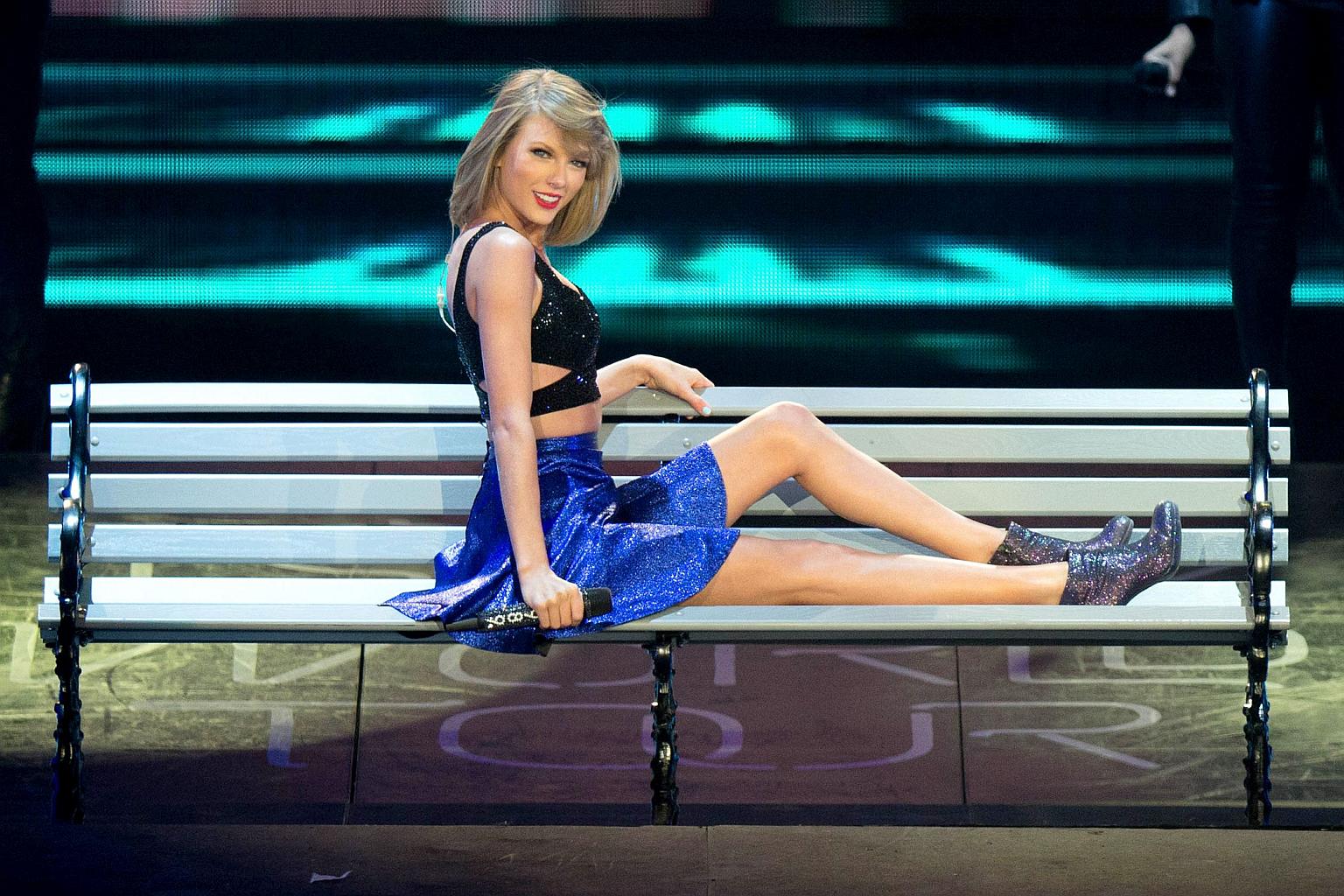Swift-ly forcing Apple's hand, to the cheers of millennials
Sign up now: Get ST's newsletters delivered to your inbox

Taylor Swift performs onstage during Rock in Rio USA at the MGM Resorts Festival Grounds on May 15, 2015 in Las Vegas.
PHOTO: AFP
Lee Jian Xuan
Follow topic:
When the news first broke on Monday that Taylor Swift, pop music's current darling and leading sales juggernaut, had forced the hand of Apple, the world's second biggest tech giant, in a tussle over music streaming royalties, I was elated.
As a rabid Swiftie (as her groupies are called) who has followed her loyally since she was shedding teardrops on her guitar, I joined in the chorus of approval erupting across the Internet, where fans and musicians from Christina Perri to her current beau Calvin Harris voiced their support. Singer-songwriter Elvis Costello hailed her polite but stern rebuke penned on Tumblr, the confessional blogging platform wildly popular among her tween audience, as a "note from our future President".
Taylor Swift, I crowed to my unimpressed friends and colleagues, had leapt into the league of bona fide celebrity influencers alongside the likes of U2's frontman Bono and Facebook founder Mark Zuckerberg.
To me, this latest saga signals how Swift has come of age, and how far she has come. From the proverbial girl-next-door writing about high school and lounging on the sidelines pining for her crush, she is now a wiser, older woman wielding her considerable influence to pressure one of the world's most powerful companies. The result: Apple changed its mind and agreed to pay royalties for streams during their customers' free three-month trial period.
Swift is no flash-in-the-pan activist cashing in quick brownie points. She has donated to the public school system of New York City (her newfound home), is an outspoken opponent of bullying and has long taken up arms against music streaming.
Many will remember how she abruptly pulled her entire catalogue from music streaming service Spotify late last year to protest what she felt was unfair compensation, and her spirited opinion editorial on the topic in the Wall Street Journal.
"Music is art, and art is important and rare. Important, rare things are valuable. Valuable things should be paid for. It's my opinion that music should not be free," she pointed out.
It is this unswerving consistency paired with a piercing clarity of thought, which makes outsiders sit up and listen to Swift, whose career has not even lasted a full decade.
But for fans like me, our admiration for Swift stems from far more than her ability to change the world, impressive as it is. Rather, it is the intensely personal connection that she has carefully cultivated with us, not through releasing albums and holding concerts, but by being a constant push notification away.
Swift's social media savvy and reach today far surpasses that of peers like Selena Gomez, Miley Cyrus and even industry veteran Beyonce - her Twitter following, at 59.3 million, is the fourth highest worldwide. Like a trusty BFF, she is perpetually camped out online, always ready to Instagram a lazy night in with her pet cats, or slip words of comfort and empowerment to downtrodden fans on Tumblr.
"You're a target because you live your life loudly and boldly… don't let them stop you from singing or dancing around to your favorite song," she once wrote to a bullied fan, echoing the sentiment behind her gutsy number one anthem Shake It Off.
In a millennial age where confessional writing is all the rage, Swift's autobiographical approach to writing music has hit especially close to home. From her sophomore country effort Fearless, to the polished pop rhythms of 1989 today, she has been right there with us listeners as we grew up - falling in love, breaking up, and finding herself while sometimes dancing in the pouring rain.
Yet intelligent and sensitive as she might be, Swift, like us, sometimes lets her tantrums get the best of her.
Her latest single, Bad Blood, for instance, is a diss track directed at frenemy and fellow starlet Katy Perry, with whom she has feuded over backup dancers ("Cos baby now we got bad blood, you know we used to be mad love. So take a look at what you've done").
Then there are the songs penned about her string of high-profile failed romances, most notably Dear John, a scathing diatribe excoriating former flame John Mayer ("You are an expert at sorry, and keeping lines blurry.. all the girls that you've run dry have tired lifeless eyes, 'cause you've burned them out").
So, in the end, who is Taylor Swift? Is she the breezy, doe-eyed pop savant who has engineered a career from being the relatable big sister to a legion of teenage girls? Or the eloquent girl next door with a mean streak, who has let popularity get to her head, occasionally using her records as a personal slam book?
The answer, I think, is somewhere in between. Swift's appeal lies in how many young fans alternate between seeing themselves in her, and wanting to be her. And because she has successfully narrowed the traditional distance between star and fan, being Taylor, or at least living like her, feels within reach.
At 25, she's where we want to be - smart, accomplished, independent and surrounded by a posse of cool friends (Lorde and Lena Dunham, among others).
But just like us, she's also flawed, growing up and prone to fits of pique and angst. In one of her songs, 22, an ode to youth, it is as if she is speaking for our generation when she belts: "We're happy, free, confused and lonely at the same time."
jianxuan@sph.com.sg

